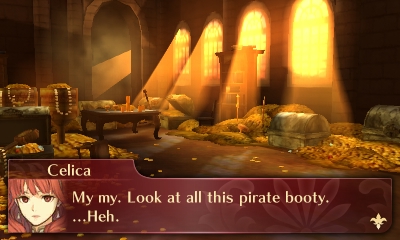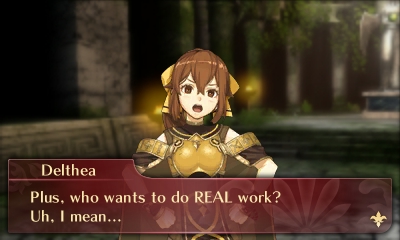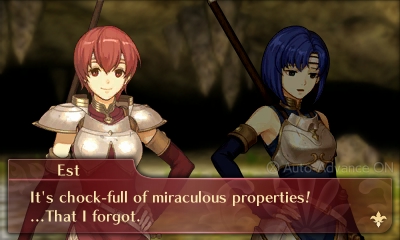Fire Emblem Echoes: Shadows of Valentia
After two new entries, Intelligent Systems decided to work on a remake of a previous title. While some guessed that the next Fire Emblem entry would use Genealogy of the Holy War in order to use the marriage and second generation system for a third time, the developer instead tackled a game considered the black sheep of the series: Gaiden. This came off as especially odd since the developer released New Mystery of the Emblem after Shadow Dragon, which are remakes of the third and first games in the series, respectively. According to producer Hitoshi Yamagami, Intelligent Systems decided to go with a remake of the second game because the then-future Nintendo Switch’s specifications had not been decided yet, so it was too soon to begin development on a game for the platform and there was too little time to make an original game for the 3DS. Many staff members wanted to implement features cut from Fates into a remake of Gaiden, and the rest, as they say, is history.
The most surprising thing about Echoes is how many of Gaiden‘s quirky features returned and were updated. Some mechanics not seen since Gaiden are dungeons, towns, promoting classes at a shrine instead of using items or just reaching the right level, spells learned by level-up instead of the use of tomes, and magic draining HP instead of expending a set number of tome uses. These third-person dungeons are usually not too long and when an enemy is encountered, a traditional tactical battle is engaged. By getting a preemptive strike, the battle starts with all enemies having reduced HP and characters stand closer to enemies than in a regular battle. Dungeons make for a refreshing change of pace for the series, although the long-winded final dungeon in the game is a bit of a drag. The previously-mentioned towns are different from the original Gaiden in that rather than being fully explorable, towns are navigated by point-and-click like in an adventure game.
Although Echoes retains several of its unique features, many series staples and other new mechanics appear as well. Unsurprisingly, Echoes sports a Casual Mode, but there is also a new item called Mila’s Turnwheel. This allows players to rewind turns in a battle in order to correct mistakes. The Turnwheel acts as an interesting middle ground between keeping permanent death and turning it off entirely. Players can still get the increased challenge, but have a limited number of times per battle that they can fix a mistake and avoid having to start the fight all over again.
The fatigue system found in dungeons hails from Thracia 776, although it works a little differently. In both games, characters accumulate fatigue points, but in Thracia 776, it benched them for a time, while in Echoes, characters suffer from a stat reductions. Either way, it encourages players to use different characters, and the ability to grind on map encounters makes it easier to level up several characters rather than focusing on one “team.”
The addition of support conversations was to be expected after their popularity in Awakening and Fates (if to a lesser extent). Most units can only support two other characters, but what Echoes lacks in quantity it makes up for in quality. 8-4 again outdid itself with localizing the script, and supports are especially well-written. The conversations do an exceptional job of revealing character personalities and backgrounds, making the cast fleshed out and likable. This strong characterization is not even limited to supports, as several units continue to appear during the main story and comment on events. Celica or Alm can even speak to characters in towns and at Mila shrines in dungeons in a manner similar to base conversations in earlier games. This is especially remarkable since most of these characters had very little in the way of personality and only maybe one or two lines each in the original Gaiden.
Supports are further enhanced by a first-time feature for the main series: fully-voiced dialogue. There have been voiced cutscenes since Path of Radiance and Awakening introduced voiced quips during battle and at the beginning of sentences during dialogue to add flavor. Echoes took this several steps further, with all but the most insignificant of lines being fully voiced. The voice actors did a fantastic job, as did the voice director Wendee Lee. Nearly every actor, especially those that portrayed the protagonists and playable units, gave exceptional performances. Cherami Leigh stands out as the Mage Mae, who has become a fan favorite due to her cheerful disposition and amusing but playful spats with Boey. Alexis Tipton as the Pegasus Knight Clair is also noteworthy, as she excellently portrays Clair as a slightly haughty but still good-natured noblewoman. Ian Sinclair’s performance as the villain Berkut is arguably the best in Echoes. The raw emotion in Ian’s voice as Berkut suffers a breakdown is chillingly good.
As hinted throughout the rest of this section, Fire Emblem Echoes has the strongest story in years, rivaling the Tellius games. The basic plot of Gaiden is largely the same, with the continent of Valentia being split by divine decree between warring sibling gods. Separated childhood friends Alm and Celica both battle in their own ways to end the coming war between Zofia and Rigel. The story is very well-written, especially compared to the previous two entries. Politics, both among humans and among gods, plays a strong role and the villains have intricate motivations, something lacking or too well hidden in Awakening and Fates. Berkut is hailed as being the best villain in the series, and it has as much to do with his complex characterization as it does with Ian Sinclair’s stellar voice acting. Echoes even sports extra scenes called Memory Prisms, which depict an event in the past, further expanding upon the game’s plot, characters, and lore.
Interestingly, though perhaps not surprisingly, some story was added to make the game fit better into the current Fire Emblem canon. For a non-spoiler example, Mila and Duma used to be nondescript, though probably human-like gods. In Echoes, they are now divine dragon manaketes, like Naga. If there’s anything resembling an overarching plot in the Archanea Fire Emblem games, it’s the story of the degeneration of dragons and their conflicts with humans. Other ties are made to the Archanea titles, including the bonus sixth chapter, which sees the combined armies of Alm and Celica traveling to a specific location on that continent. Although any mentions of the greater multiverse are absent, the continuity nods are apparent and appreciated.
DLC makes a comeback, though there is somewhat less of it compared to Fates, and the prices are more reflective of Awakening, being a little on the high side. A DLC pack that I find to be particularly worth the money is Rise of the Deliverance, which details events that happen before the start of the game and even provide new Memory Prisms to view.
Fire Emblem Echoes is not without its faults, especially in terms of gameplay. Many fans would say that it stuck too close to the original Gaiden with its somewhat plain and overly large battle maps and curious lack of the Weapon Triangle, which was even integrated into the previous remakes. Most of the playable units received huge boosts to their stats and their growth potential, but almost all of them still have a hard time increasing their magic resistance. This makes them vulnerable to the annoyingly persistent witch enemies. The gameplay is more engaging than in Awakening and Fire Emblem Fates: Birthright but it pales in comparison to Conquest and Revelation.
Echoes was certainly a gamble, but one that paid off for Intelligent Systems. While a hard number is difficult to find, the game sold very well and is considered a success. Echoes also proved that a Fire Emblem could do well without having the popular Avatar, marriage, and second generation system of the first two 3DS titles. Many people praise the game for its strong story and characters, fantastic voice acting, excellent presentation and great music. Even the characters designs by Japanese illustrator Hidari were well-received. It may be a stretch to call Echoes a return to form, and while future games likely won’t (or shouldn’t) follow it too closely, it is a step in the right direction.
Josh’s Response:
When Fire Emblem Echoes: Shadows of Valentia was announced, I wasn’t shocked that Intelligent Systems had chosen a remake, but I was surprised that it picked the black sheep of the Fire Emblem family. Even more surprising was the decision to ditch both old and new series staples such as the Weapon Triangle and marriage while keeping third-person dungeons and town exploration. After Fates left a bit of a sour taste in my mouth, Echoes helped revitalize my love of the series.
The game has several interesting facets, but Mila’s Turnwheel tops the list for me. Ever since Tactics Ogre: Let Us Cling Together, I’ve been waiting for a strategy RPG to steal the CHARIOT system and incorporate that into gameplay. So long as there are some limits to maintain the difficulty balance, the ability to roll back turns in a strategy RPG removes so much annoyance from play. I know permadeath is core to the Fire Emblem experience but having the ability to correct small mistakes or cases of losing to the RNG is welcome.
Echoes was pretty fantastic overall, but one part of the experience I loathed were the witch enemies. With the ability to spawn multiple enemies every other turn, the masses of low-level enemies were a pain. I hate these types of units in strategy RPGs and I think they are an especially bad fit for a game where keeping characters alive is paramount. It made a few of the maps that featured them a slog as I had to keep strong defensive characters out front, slowly pushing forward while keeping the rest safe in the rear.
I also felt that while the story was strong, the voice acting was stellar and made the story and characters a joy. The voice acting was so good I would set the 3DS down, put text advancement on auto, and take in the performances. Clair’s voice actor in particular just nailed that slightly haughty voice and it made her my favorite character in the game.
After Fates, where Intelligent Systems attempted to be everything to everyone and ultimately failed to deliver a coherent experience for anyone, Echoes eschewed many series staples and struck out on its own to create something fun and unique. It turned out to be the Fire Emblem game that I didn’t know I wanted. I wouldn’t want every Fire Emblem game to be like Echoes, but it was a fantastic experience with a great story that rejuvenated my love of the franchise.











Recent Comments